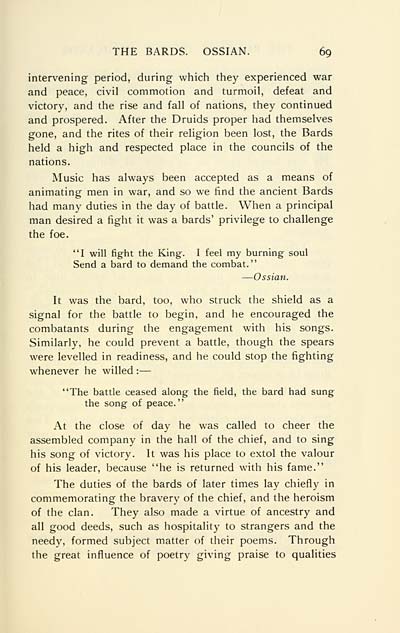Download files
Complete book:
Individual page:
Thumbnail gallery: Grid view | List view

THE BARDS. OSSIAN. 69
intervening period, during which they experienced war
and peace, civil commotion and turmoil, defeat and
victory, and the rise and fall of nations, they continued
and prospered. After the Druids proper had themselves
gone, and the rites of their religion been lost, the Bards
held a high and respected place in the councils of the
nations.
Music has always been accepted as a means of
animating men in war, and so we find the ancient Bards
had many duties in the day of battle. When a principal
man desired a fight it was a bards' privilege to challenge
the foe.
"I will fight the King. I feel my burning soul
Send a bard to demand the combat."
— Ossian.
It was the bard, too, who struck the shield as a
signal for the battle to begin, and he encouraged the
combatants during the engagement with his songs.
Similarly, he could prevent a battle, though the spears
were levelled in readiness, and he could stop the fighting
whenever he willed : —
"The battle ceased along the field, the bard had sung
the song of peace."
At the close of day he was called to cheer the
assembled company in the hall of the chief, and to sing
his song of victory. It was his place to extol the valour
of his leader, because "he is returned with his fame."
The duties of the bards of later times lay chiefly in
commemorating the bravery of the chief, and the heroism
of the clan. They also made a virtue of ancestry and
all good deeds, such as hospitality to strangers and the
needy, formed subject matter of their poems. Through
the great influence of poetry giving praise to qualities
intervening period, during which they experienced war
and peace, civil commotion and turmoil, defeat and
victory, and the rise and fall of nations, they continued
and prospered. After the Druids proper had themselves
gone, and the rites of their religion been lost, the Bards
held a high and respected place in the councils of the
nations.
Music has always been accepted as a means of
animating men in war, and so we find the ancient Bards
had many duties in the day of battle. When a principal
man desired a fight it was a bards' privilege to challenge
the foe.
"I will fight the King. I feel my burning soul
Send a bard to demand the combat."
— Ossian.
It was the bard, too, who struck the shield as a
signal for the battle to begin, and he encouraged the
combatants during the engagement with his songs.
Similarly, he could prevent a battle, though the spears
were levelled in readiness, and he could stop the fighting
whenever he willed : —
"The battle ceased along the field, the bard had sung
the song of peace."
At the close of day he was called to cheer the
assembled company in the hall of the chief, and to sing
his song of victory. It was his place to extol the valour
of his leader, because "he is returned with his fame."
The duties of the bards of later times lay chiefly in
commemorating the bravery of the chief, and the heroism
of the clan. They also made a virtue of ancestry and
all good deeds, such as hospitality to strangers and the
needy, formed subject matter of their poems. Through
the great influence of poetry giving praise to qualities
Set display mode to: Large image | Transcription
Images and transcriptions on this page, including medium image downloads, may be used under the Creative Commons Attribution 4.0 International Licence unless otherwise stated. ![]()
| Early Gaelic Book Collections > Ossian Collection > Romance of the Highlands > (99) |
|---|
| Permanent URL | https://digital.nls.uk/81816813 |
|---|
| Description | Selected books from the Ossian Collection of 327 volumes, originally assembled by J. Norman Methven of Perth. Different editions and translations of James MacPherson's epic poem 'Ossian', some with a map of the 'Kingdom of Connor'. Also secondary material relating to Ossianic poetry and the Ossian controversy. |
|---|
| Description | Selected items from five 'Special and Named Printed Collections'. Includes books in Gaelic and other Celtic languages, works about the Gaels, their languages, literature, culture and history. |
|---|

